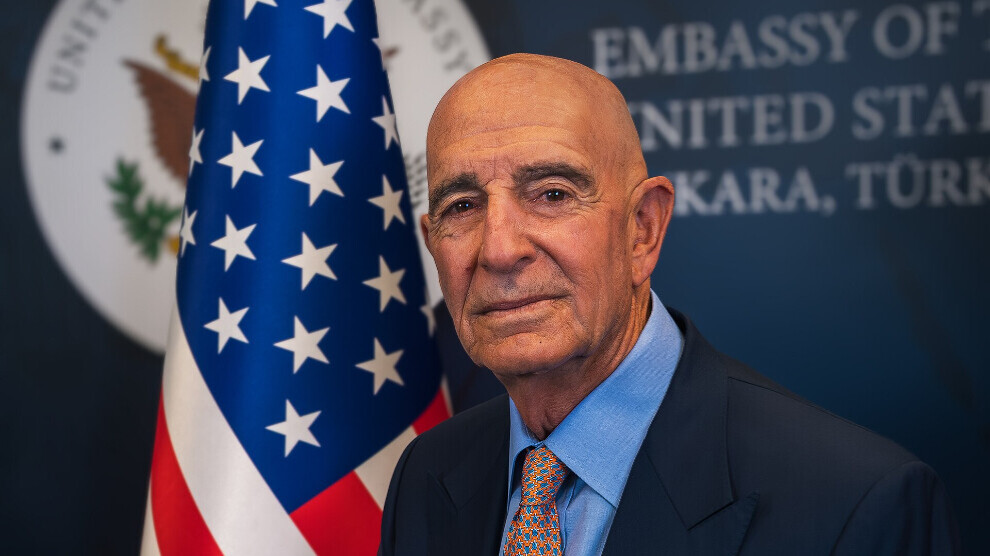What role will Barrack play in Syria’s future?
Thomas Barrack and his team prioritize Turkey’s interests while ignoring the realities faced by local communities in the region.
Thomas Barrack and his team prioritize Turkey’s interests while ignoring the realities faced by local communities in the region.

Reports have emerged that Thomas Barrack, the United States Special Representative for Syria, is expected to meet with the Syrian Democratic Forces (SDF) administration and discuss relations with Damascus. The Trump administration appears intent on bringing Syria under its sphere of influence in one form or another. And it cannot be said that Ahmed Al-Sharaa (Al-Jolani) is disturbed by this. His meeting with Trump suggests nothing else. The likely outcome is Syria’s eventual inclusion in the Abraham Accords.
For Al-Sharaa, power takes precedence over religion or ideology. He is shrewd enough to understand that remaining in power requires the backing of the United States and Israel. His mentor and sponsor is none other than Recep Tayyip Erdoğan.
In terms of mindset, Erdoğan is no different from Hay’at Tahrir al-Sham (HTS). Turkey is the only state in the region that does not clash with HTS on a strategic or ideological level. HTS, in its current form, seeks to establish a more centralized regime than the Ba’ath government. Its key difference from Bashar al-Assad lies in attaching more religious elements to the concept of governance.
From both a religious and sectarian perspective, there is no contradiction between HTS and Erdoğan. Excluding democracy and establishing a hyper-centralized authority aligns perfectly with Erdoğan’s political vision. A democratic Syria is neither Erdoğan’s demand nor preference. The more authoritarian the system HTS establishes, the more easily Erdoğan can work with them.
Erdoğan seeks to reach an agreement with Trump to sideline the SDF. He repeatedly insists that “the SDF must be absorbed into the Syrian army and dissolved from within.” Security has not yet been achieved in Syria, but the safety of the autonomous region and its people holds no significance for them. Turkey’s priority remains the dismantling of the SDF and ensuring that Kurds are denied any form of political status.
The United States, Syria, and Turkey are currently working on a plan to transfer control of ISIS camps and prisons to the Damascus government. Negotiations with the United States on this matter are already underway. While Turkish officials publicly speak of building “Kurdish-Turkish brotherhood,” they simultaneously continue efforts to eliminate the Kurdish presence on the ground.
Thomas Barrack is fully aware of Turkey’s demands. HTS agrees to everything in public, yet in practice, continues to follow its own agenda. Those recruited into the military and security forces are placed in religious and sharia-based training programs. The goal is to absorb them ideologically and secure their submission. It would be naive to assume that the United States and European powers are unaware of these practices. Even the so-called temporary constitution drafted in the region is completely devoid of democratic content, yet no serious objection has been raised. Barrack and his team have focused exclusively on Turkey’s sensitivities, completely disregarding the actual conditions experienced by people in the region.
But is the revolution in Syria solely the work of HTS? The SDF have suffered over twenty thousand casualties and injuries. They defeated ISIS in cooperation with the international coalition. If not for that victory, if not for the presence of the SDF, would HTS even have the opportunity to position itself in Damascus today? These historical facts are deliberately ignored.
Barrack and his team ought to ask HTS why the peoples of the Autonomous Administration have been excluded from governance. On March 10, an agreement was signed with HTS. Yet HTS has not included a single representative from North and East Syria, home to one-third of the country’s population, in any governmental structure. They have not given them roles in any ministries. HTS clearly does not want to share power with anyone. Perhaps the Autonomous Administration did not formally raise this demand or chose not to prioritize it at the time.
However, these communities have a legitimate right to participate in governing the country. If they are excluded, HTS will simply replace the Ba’ath regime with another form of authoritarian rule. What is urgently needed is both democratization and stronger power-sharing mechanisms. The issue is not simply whether the SDF should be integrated into the national army. The real question is: “Why have these communities not been included in the government or other administrative bodies?” This must be asked and insisted upon.
Moreover, HTS does not resolve conflicts through democratic means. In past conflicts with the Alawite population, they resorted to violence, leading to massacres. Alawite women and girls have been abducted, treated as war spoils. These reports have been widely covered in the media.
HTS shows no different attitude toward the Druze community. If it had the power and means, it would impose total allegiance on all communities and subject those who resist to massacres. These are not mere predictions or speculative commentary; they are patterns rooted in years of observed actions and practices.
In recent days, a suicide bombing targeted a church in Damascus, resulting in a massacre. What kind of mindset and spirit could justify such violence? How can human beings be condemned to death simply because they belong to a different religion or belief? Do they intend to erase the world’s religious diversity through mass killing?
These lands are ancient. For thousands of years, peoples of different ethnicities and beliefs have coexisted here. And now, are they to be eradicated and driven away? Christians and people of other faiths are being “cleansed” from these lands. The goal is to make them feel unsafe, so they are forced to leave.
This is the mindset of HTS. There can be no doubt about it. If that were not the case, they would have adopted serious measures and taken meaningful steps by now.